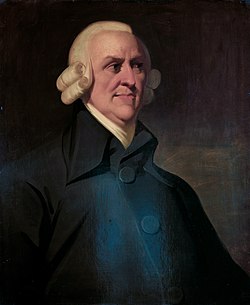Adam Smith Quote
Civil government, so far as it is instituted for the security of property, is in reality instituted for the defense of the rich against the poor, or of those who have some property against those who have none at all.
Adam Smith
Civil government, so far as it is instituted for the security of property, is in reality instituted for the defense of the rich against the poor, or of those who have some property against those who have none at all.
Tags:
communism, democracy, freedom, history, hope, individualism, philosophy, politics, revolution, socialism
Related Quotes
Attempts to locate oneself within history are as natural, and as absurd, as attempts to locate oneself within astronomy. On the day that I was born, 13 April 1949, nineteen senior Nazi officials were...
Christopher Hitchens
Tags:
alcohol, alcoholism, andrei gromyko, antisemitism, astrology, astronomy, beijing, birth, birthdays, breastfeeding
It's WW2 and there are wage controls in place. Instead of health care, companies decide to offer employees shoes. Having absorbed those costs, they later lobby for every company to be required to offe...
Jeffrey Tucker
Tags:
anarcho capitalism, anarchy, coercion, collectivism, communism, economics, free, free markets, freedom, government
Dear Anarcho-Communist,If you and I ever find ourselves in a stateless society, have no fear. Just mention that you are a communist, and I promise I will never try to "oppress" and "exploit" you by of...
Larken Rose
Tags:
anarcho capitalism, anarchy, ancap, ancom, coercion, collectivism, communism, freedom, laissez faire, libertarian
About Adam Smith
Adam Smith (baptised 16 June [O.S. 5 June] 1723 – 17 July 1790) was a Scottish economist and philosopher who was a pioneer in the field of political economy and key figure during the Scottish Enlightenment. Seen by some as the "father of economics" or the "father of capitalism". He is known for two classic works: The Theory of Moral Sentiments (1759) and An Inquiry into the Nature and Causes of the Wealth of Nations (1776). The latter, often abbreviated as The Wealth of Nations, is regarded as his magnum opus, marking the inception of modern economic scholarship as a comprehensive system and an academic discipline. Smith refuses to explain the distribution of wealth and power in terms of divine will and instead appeals to natural, political, social, economic, legal, environmental and technological factors, as well as the interactions among them. The work is notable for its contribution to economic theory, particularly in its exposition of concept of absolute advantage.
Smith studied social philosophy at the University of Glasgow and at Balliol College, Oxford, where he was one of the first students to benefit from scholarships set up by John Snell. Following his graduation, he delivered a successful series of public lectures at the University of Edinburgh, that met with acclaim. This led to a collaboration with David Hume during the Scottish Enlightenment. Smith obtained a professorship at Glasgow, where he taught moral philosophy. During this period, he wrote and published The Theory of Moral Sentiments. Subsequently, he assumed a tutoring position that facilitated travel throughout Europe, where he encountered intellectual figures of his era.
In response to the prevailing policy of safeguarding national markets and merchants through the reduction of imports and the augmentation of exports, a practice that came to be known as mercantilism, Smith laid the foundational principles of classical free-market economic theory. The Wealth of Nations was a precursor to the modern academic discipline of economics. In this and other works, he developed the concept of division of labour and expounded upon how rational self-interest and competition can lead to economic prosperity. Smith was controversial in his day and his general approach and writing style were often satirised by writers such as Horace Walpole.
Smith studied social philosophy at the University of Glasgow and at Balliol College, Oxford, where he was one of the first students to benefit from scholarships set up by John Snell. Following his graduation, he delivered a successful series of public lectures at the University of Edinburgh, that met with acclaim. This led to a collaboration with David Hume during the Scottish Enlightenment. Smith obtained a professorship at Glasgow, where he taught moral philosophy. During this period, he wrote and published The Theory of Moral Sentiments. Subsequently, he assumed a tutoring position that facilitated travel throughout Europe, where he encountered intellectual figures of his era.
In response to the prevailing policy of safeguarding national markets and merchants through the reduction of imports and the augmentation of exports, a practice that came to be known as mercantilism, Smith laid the foundational principles of classical free-market economic theory. The Wealth of Nations was a precursor to the modern academic discipline of economics. In this and other works, he developed the concept of division of labour and expounded upon how rational self-interest and competition can lead to economic prosperity. Smith was controversial in his day and his general approach and writing style were often satirised by writers such as Horace Walpole.
